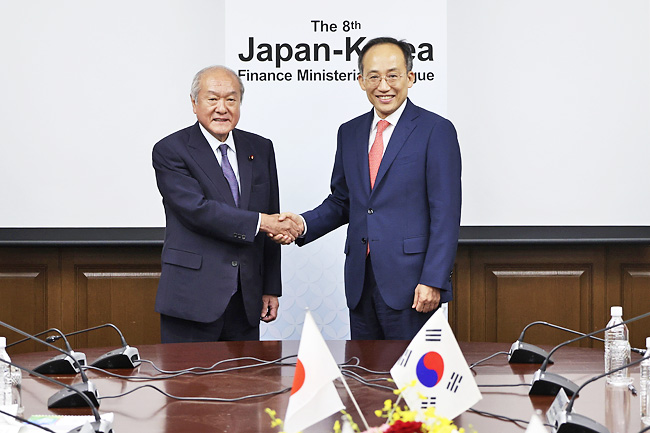TOKYO (AP) – Japan and South Korea agreed yesterday to revive a currency swap agreement for times of crisis, in the latest sign of warming ties.
Japanese Finance Minister Shunichi Suzuki announced the agreement after meeting with his South Korean counterpart Choo Kyung-ho. It was the first time the two countries have held annual financial talks in seven years, though Suzuki and Choo also met in South Korea in May.
Suzuki told reporters that the three-year currency swap agreement would help reinforce trust in the financial stability of the two countries as a fallback in an emergency. But he emphasised that Japan is fully prepared to deal with fluctuations in the Japanese yen, which has weakened sharply against the US dollar in the past year.
The USD10-billion swap arrangement expired in 2015 and had not been renewed. Largely symbolic, it allows the South Korean and Japanese central banks to exchange currencies for each country’s reserves of US dollars to provide extra liquidity, or cash supplies, in case of a crisis.
The two major Asian economies, both United States allies, have recently mended ties as they contend with challenges, despite tensions over issues left over from Japan’s 35-year occupation of the Korean Peninsula before and during World War II.
From July 21, Japan plans to reinstate South Korea as a preferred nation with fast-track trade status. That will essentially end a four-year trade dispute that began in July 2019 when Japan removed South Korea from its “white list” of countries given fast-track approvals in trade.
Japan also tightened export controls on key chemicals used by South Korean companies to make semiconductors and displays, prompting South Korea to file a complaint with the World Trade Organization and remove Japan from its own list of countries with preferred trade status.
South Korean President Yoon Suk Yeol and Japanese Prime Minister Fumio Kishida met in March in the first formal summit between the two countries since 2015.








